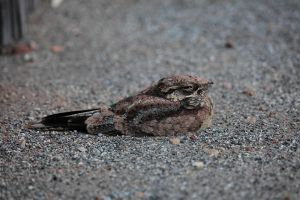A draft Jiwarli-English dictionary with English-Jiwarli finderlist is currently being prepared. Click on the link below to download a sample of the first two pages of the dictionary. The full dictionary has approximately 1,500 entries, with thousands of example sentences and cross-references.
Month: June 2015
What does Jiwarli sound like?
In order to introduce the Jiwarli language and its last speaker, Jack Butler, here is the beginning of a traditional story that Jack recorded on 3rd November 1983 and transcribed and translated with Peter Austin on 17th May 1984.
The story tells the tale of the bird gabagurda ‘spotted nightjar’ (Eurostopodus argus) and the bat migalyaji ‘type of bat’ (species unknown). These two are related as ngadhal ‘same sex cross-cousins’; the term ‘cross-cousin’ means either the child of one’s father’s sister or the child of one’s mother’s brother. Since the two protagonists are understood to be male, ngadhal here can mean either ‘father’s sister’s son’ or ‘mother’s brother’s son’. In Jiwarli this kind of cousin is distinguished from bungali ‘opposite sex cross-cousin’, that is, for a woman it would be her father’s sister’s son, or mother’s brother’s son. For a man bungali refers to his cousin who is his father’s sister’s daughter or his mother’s brother’s daughter.
The two protagonists kill a man called Bibijungurru, boss of all the people. After some travels they secretly spear him while he is lying in a bough shade. They are caught by Bibijungurru‘s group and punished for their misdeeds by being speared and beaten with boomerangs and women’s yamsticks. Their legs were broken so that today both creatures lie on the ground when they land and they must both drink water on the wing, rather than being able to stand and drink like other animals. As with other Australian Aboriginal groups, traditional stories like this come from the Dreamtime, described in Jiwarli as ngurra bularalaburra ‘when the earth was soft’, and they provide a foundation for understanding the characteristics and behaviour of the animals and places as they are today. Such stories often also involve extensive travel through named places (called in English ‘Dreaming tracks’ or ‘Songlines‘) — we will discuss this more in a later blog post.
Here we present the first five lines of the story as told by Jack Butler:
We can write this in Jiwarli as follows (see Spelling for details of the letters and the way we spell Jiwarli):
Gabagurda mandharda and migalyaji
Gabagurda migalyaji
Paja yananyja mandhardawu yiniyi Bibijungurruwu
Maadha ngunha mandhardanyjarriyi Bibijungurru
Warri nhugubarnti ngunha baja yananyja
Ngunhagayi gajiriwari gamparninyjalu gajiriyi gamparninyja ngunhiba yirrara
We can translate this into English as follows (note that spears are heated over the fire in order to straighten and strengthen them):
‘The Nightjar man and Bat. Nightjar (and) Bat. They were angry with a man named Pipijunkurru. That Pipijunkurruwas the boss of the people. They didn’t go along angry from nearby. After having first heated their spears at Mt Florrie, they heated them there at the top.’
The rest of the story deals with their further adventures and we will return to it later, once some details of the structure of Jiwarli are presented. This will enable readers to understand the grammar and translation of the full Jiwarli story.
Welcome to the Jiwarli blog
This blog concerns the Jiwarli language (also spelt Djiwarli, Tjiwarli) which was traditionally spoken along the upper reaches of the Henry River, a tributary of the Ashburton River, in the north-west of Western Australia. The language was unrecorded until 1978 and is now extinct; the last person who learnt to speak Jiwarli as a child, Mr Jack Butler, passed away on 24th April 1986. Before his death Jack Butler worked with Peter Austin to record over 70 texts in a range of genres, including mythology and personal history, a vocabulary of around 1,500 words and grammatical elicitation of morphological paradigms and syntactic constructions. Publications on the language include a bilingual dictionary (Austin 1992), a text collection (Austin 1997), and articles on morpho-syntax (Austin and Bresnan 1996, Austin 1995, 1998, 2000, 2001). A grammar of Jiwarli is being prepared for publication.
Continue reading

